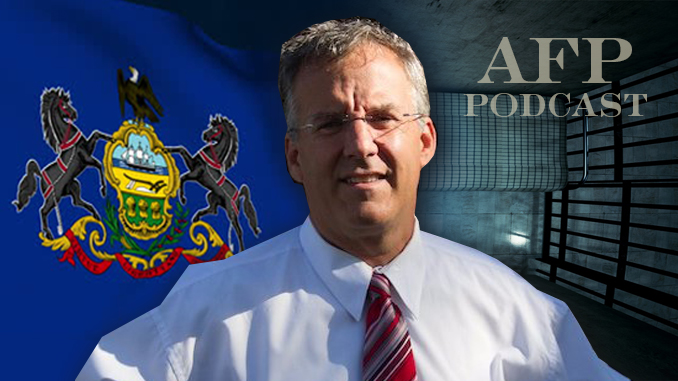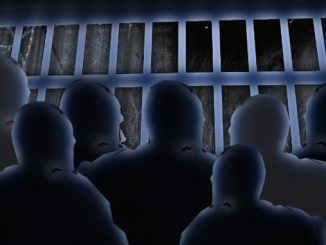
Pennsylvania powerbrokers have repeatedly abused the legal system to lock up a political opponent, according to a former civil rights attorney in Pennsylvania, by misusing a mental health act original intended to protect individuals with symptoms of mental illness.
By Dave Gahary
A law on the books in the Keystone State intended to apply to individuals with mental illness is now being used for a more sinister purpose: to involuntarily commit political opponents who pose a threat to the established power structure in the commonwealth’s capital.
Andrew J. Ostrowski, a former Pennsylvania civil rights attorney, found himself in the sights of the powers-that-be in Harrisburg, and learned the hard way how the 1976 Mental Health Procedures Act (MHPA) is being used to chill criticism of the power prism.
The MHPA “establishes procedures for the treatment of mentally ill persons” and “set[s] forth the Commonwealth’s policy and procedures regarding the provision of mental health services.” Article III of the act defines the requirements and limitations on involuntary emergency examination, treatment, and hospitalization of individuals who present a “clear and present danger to others.” That key phrase is defined as meaning “within the past 30 days the person has inflicted or attempted to inflict serious bodily harm on another and that there is a reasonable probability that such conduct will be repeated.”
Longtime American Free Press subscriber and supporter Dorene Shutz tipped off this reporter to Ostrowski’s recent kidnapping. “He is awake to the corrupt courts,” she explained.
On Aug. 26, this reporter spent most of the day with Ostrowski, Ms. Shutz, and other mild-mannered patriots at The Nationalist Times conference, and found all the participants to be scholarly truth-seekers. None who were present that day could ever be considered severely mentally ill and in need of involuntary treatment by even the most incompetent authority, but that says nothing of corrupt authority.
Ostrowski was born and raised in Lancaster, Penn., attended Millersville University, and “was in the first graduating class at Widener University” in Harrisburg.
“I trained for several years in the formal legal law firm environment,” he told AFP. He soon discovered, however, that his chosen profession as an “officer of the court” wasn’t what he thought it might be.
“I had been a practicing lawyer until 2010 when I ran into disciplinary issues,” he said, “and, as I distanced myself from the formal practice and started to look at these things, I started to see that there really was no basis for the licensing of the practice of law. The licensing of the practice of law really is an impediment to everybody’s access to justice, because your attorney is not free to advocate without risking his or her own property.”
On Aug. 23, Ostrowski filed a motion, attacking what he saw as a corrupt system.
“I filed what is called a motion for declaratory relief,” he explained, “which is a vehicle that gives you access to have declarations made that certain things are constitutional, not constitutional, lawful, and unlawful. And I did it to challenge the basis of the attorney law license. This . . . is a very significant motion that really would upset the entire judicial structure in this country.”
Sitting at his desk on Sept. 19, Ostrowski found out how significant it really was.
“I posted a notice on Facebook and sent out emails notifying people I was going on Facebook Live and, within 15 minutes of that, the police were at my door.”
Facebook Live allows a user to broadcast live video streams, requiring nothing more than a computer with a video camera and a Facebook account.
“I looked out the front window,” he said, “and there was a cop climbing over my railing to come around back, so I went around to the back door and locked it, and I went on Facebook Live. And then somehow, they got a key and they came in with gloves on and with their tasers pulled, three of them, a female and two males.”
The webcam captured the interaction between Ostrowski and the police, who entered his home without his permission. In the video, Ostrowski can be seen asking the officers to show him their warrant. Viewers see an officer telling him they have one but then forcing Ostrowski from his desk before the video ends.
“They did not have a proper warrant; they didn’t have any paperwork,” Ostrowski said. “I had to kind of—as passively as I could—resist them dragging me into an ambulance and throwing me in without seeing some paperwork.”
The short trip from his house to the ambulance was not without injury.
“I had bruises and a cut on my wrist from the handcuffs,” he said. AFP asked what happened next.
“I was taken in to the local emergency room where they process you,” he explained, “and then they sent me to [Brooke Glen Behavioral Hospital] down in the Philadelphia suburbs. That was a horrific experience. It was clear that the agenda was, as expressed to me by the doctor, to get me on some kind of pharmaceuticals, and/or, if I refused or resisted, to have me placed long-term, and do it involuntarily. He specifically advocated for that in the hearing on Sept. 22.”
They held him there for seven days, two days longer than Section 302 of the MHPA ostensibly allows. Eventually a judge signed an order denying any commitment petition.
“They basically said I shouldn’t have been there,” explained Ostrowski. AFP asked if he had any recourse, as the judge’s ruling can’t erase the fact that he had been kept there against his will for all that time.
“Of course, yes,” Ostrowski said. “This is a gross violation of all my fundamental civil rights. There’s not one that you can discount from it, [except] maybe cruel and unusual punishment.” Alarmingly, this wasn’t the first time they came for Ostrowski, “all directly related,” he believes, “to my advocacy efforts.”
“This is the third time this year,” he explained.
Ostrowski contends that the abuse of this mental health law to truncate people’s due process rights is a clear problem.
“This is why AMERICAN FREE PRESS exists,” he said. “This is why The Nationalist Times exists. This is why you guys do what you do, because this stuff happens to real folks.”
Dave Gahary, a former submariner in the U.S. Navy, prevailed in a suit brought by the New York Stock Exchange in an attempt to silence him. Dave is the producer of an upcoming full-length feature film about the attack on the USS Liberty. See erasingtheliberty.com for more information and to get the new book on which the movie will be based, Erasing the Liberty.







This is a precursor of what is to come in the near future. When the SHTF they will just say that the constitution has been suspended since Roosevelt declared a state of energy in 1933, and additional presidents since then. Atty Ostrowski is a brave man of principle swimming with sharks.
Great article thank you Dave. The evil Zionist cabal hates truther and the constitution.